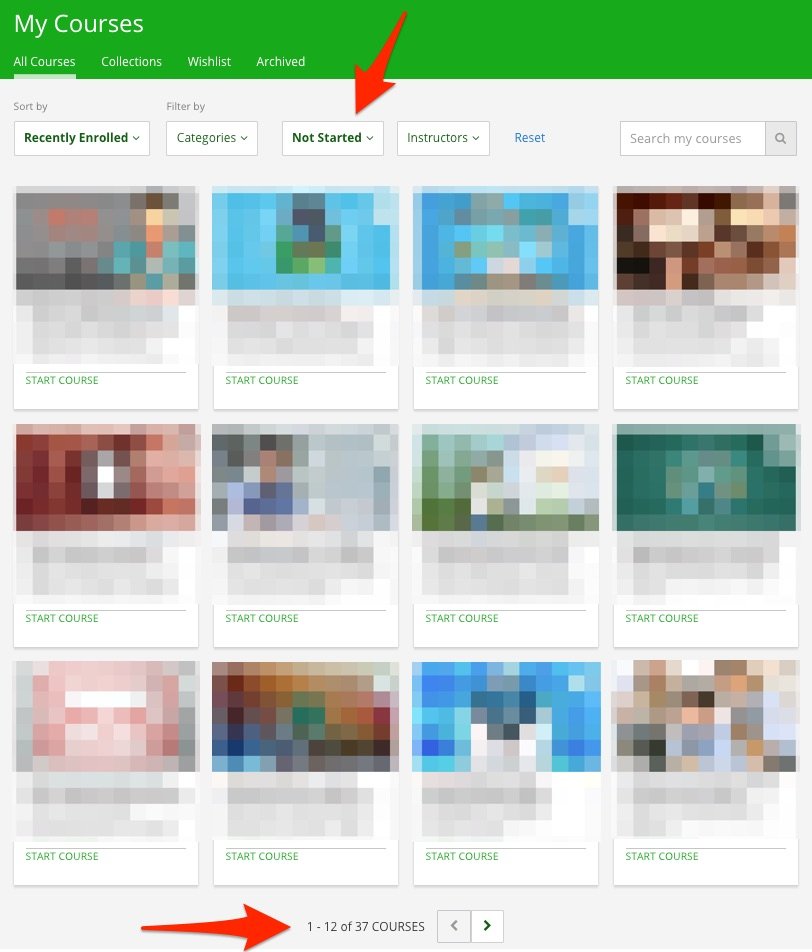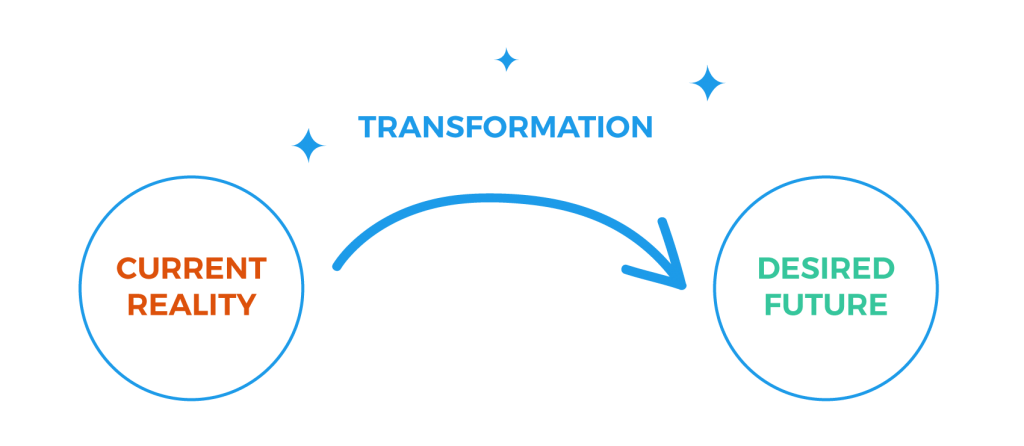The demand for online courses is exploding right now.
In 2015, we learned that the global market for online learning reached $107-billion, a number that got the attention of thousands of educators and entrepreneurs.
Just two years later, in 2017, this market has grown to reach an enormous $255-billion. This represents 238% growth—a growth rate that has some industries drooling with envy.
Yet, as thousands of people and companies have begun to create and sell online courses in response to this demand, we’ve simultaneously watched online course completion rates reach an alarming low.
A recent study by Katy Jordan, a respected education and technology researcher, estimates the average completion for MOOCs—Massive Open Online Course—to be as low as 15%.
Clearly, there is a disconnect between the number of people who create an online course and the number of people who actually complete the course they purchase, which sparks the question:
If someone isn’t completing a course, are they implementing any of the training? And if they’re not implementing the training, are they really getting any value from purchasing a course in the first place?
Low completion rates and lack of student engagement in online courses are arguably the ultimate failures of the online learning industry.
Admittedly, I am guilty of contributing to this problem.
Here is a screenshot of my Udemy account, an online course marketplace from which I’ve purchased more than 50 online courses over the past few years—I blurred the course titles so I don’t risk offending any of their instructors that might see this:

As you can see from this screenshot, I’ve purchased 37 online courses that I still haven’t even touched. This doesn’t include the courses that I’ve started and still haven’t finished. Clearly, my online course shelf is collecting some virtual dust, which sparks another question:
Is the online course market saturated?
It’s a fair question to ask, but no, I don’t think the online course market is saturated. What I will say is that the online learning industry has certainly become a crowded space to compete in.
Is there still an opportunity for aspiring course creators to profit? Absolutely. But it’s going to take more than just sharing your information to succeed.
“I think now is the perfect time to start a business by sharing your knowledge.” – Lewis Howes
We Live in the Age of Information Overload
When Udemy raised $1-million in seed funding back in 2010, the headline of a TechCrunch article stated that Udemy’s aim was to democratize online learning.
If we look at the total number of free and inexpensive online courses that have since been published on Udemy and other online course marketplaces, I’d say that some significant progress has definitely been made towards that goal.
Combining the number of online courses available today with the vast amount of free information online—via blogs, podcasts, YouTube videos, ebooks, webinars, and so on— it’s not hard to see why so many people are struggling with information overload.
Even Scott Oldford, a prominent marketing expert and founder of multiple million dollar businesses, recently shut down LeadCraft, his signature online course that generated over a million dollars in revenue for his business, because he no longer believes in selling information.
Another entrepreneur I’ve spoken about this topic with is Nicholas Kusmich, the world’s leading Facebook Advertising strategist. Kusmich told me in our podcast interview together that the year his agency grew exponentially was the same year that he stopped consuming new information.
“For so long I was like an information-holic, and I have what I now call infobesity”, Kusmich explained. “I was literally going from event to event, conference to conference, podcast to podcast, book to book, and I was reading one or two books a week, thinking and tapping myself on the back, like look at all this progress you made when in reality I wasn’t making any progress. I was just filling my head with knowledge that I wasn’t even using.”
It got to the point where Kusmich decided to go on what he called an ‘information fast.’ For a full year, he refused to consume any new content whatsoever. Instead, he simply trusted that he already had enough information and that it was time for him to apply what he knew. Did it work? Absolutely. “That was the year that we experienced multiple hundred percent growth”, Kusmich said.
Coincidence? Or is this a sign that the perceived value of information is steadily declining?
“If you let your learning lead to knowledge, you become a fool. If you let your learning lead to action, you become wealthy.” — Jim Rohn
Information Alone Is Not a Value Proposition
I’ve got an important message that I’d like to pass on to you if trying to build a business by selling your advice and how-to information:
Stop trying to sell your information.
I’m serious. If all you’re selling is information, you’re going to have a tough time competing in this industry. With an abundance of free information and online courses available today, information is the last thing we have a shortage of.
So no, your customers do not need any more information.
What your customers really need is a way get from Point A to Point B—from their current reality to their desired reality—as quickly and efficiently as possible. What they need is a transformation. Your online course is their shortcut.

[bctt tweet=”Your customers don’t need any more information. They need a transformation. @TylerBasu @Influencive” via=”no”]
Don’t Sell Information, Sell Transformation
Earlier in 2017, I had the privilege of collaborating with Thinkific and 30 other entrepreneurs to create and launch Profitable Course Creator, an online course that teaches entrepreneurs how to build a profitable online course business.
In the spirit of education, 100% of the proceeds from this course go directly to Pencils of Promise, a non-profit organization that builds schools in developing countries around the world.
Jack Canfield, Lewis Howes, JJ Virgin, Grant Cardone, Pat Flynn, Amy Porterfield, and James Altucher are just a few of the highly successful entrepreneurs and course creators that participated in this project. Brian D. Evans, Founder of Influencive, also contributed his insights to the course.
Collectively, these entrepreneurs have sold tens of millions of dollars worth of information products throughout their careers—everything from books, to seminars, coaching programs, recurring membership sites, and premium online courses.
I learned something very interesting as I interviewed many of these entrepreneurs for the course. As they built their personal brands and businesses, none of them focused on selling information to their customers. Instead, they focused on selling a transformation to their customers.
In other words, they sold the result they knew their customers wanted to achieve, and they created the products, programs, and communities to help those customers achieve that result. It’s a subtle shift in focus, yet it’s this subtle shift that makes all the difference.
Having that laser-like focus on helping their customers get results guided their decision making and content creation process as they created their products and programs. This resulted in a better experience for their customers, and more success stories to showcase in their marketing.
“We’re not in this business just to get people to buy our stuff. We want them to see the change and the impact and create the success stories.” – Nick Unsworth
Why Online Course Completion Rates Don’t Matter
If one of your goals is to build a profitable online course business, I’d like to leave you with an important concept to consider.
Your customers aren’t going to buy your course because they want to learn everything you know about XYZ topic. They’re going to buy your course because they want to achieve a specific result. To them, your course is just a way to learn how to get that result. It’s the result they value, not the information.
Here’s the kicker: your customers may not even need to complete your course in order to get the result they want.
Course completion rates, therefore, are a flawed metric for measuring the success of your online course.
Yes, there are things you can do to increase completion and engagement rates in your online course. Here are a few of them, in case you’re interested:
- Gamify the learning experience for your students
- Let your students track their progress through your course
- Give your students a specific action step at the end of each lesson
- Create different types of training to accommodate different learning styles
- Create a private discussion board or group so your students can interact with you and each other
- Send reminder emails to re-engage stragglers
- Host group coaching calls or to help hold your students accountable and answer their questions.
Fortunately, there are several online course platforms that make these things possible. But these things matter if they don’t help your students implement what they learn and get the result that was promised to them.
Think about it.
Would you want a customer that completes 100% of your course and does nothing to implement what they learn? Or would you rather have a customer that completes 30% of your course, gets exactly what they need from it, and then sends you a heartfelt testimonial to tell you how much your course changed their life?
The best metric you can use to measure the success of your course is the success of your customers. If your customers are getting what they want from your course, you’ve done your job.
Remember, you’re not selling information. You’re selling transformation.
[bctt tweet=”The best metric for measuring the success of your course is the success of your customers @TylerBasu @Influencive” via=”no”]
As thousands more educators and entrepreneurs flock into the online learning industry over the next few years, the ones who build a reputation for having successful customers will rise to the top. The rest, unfortunately, will only be adding to the virtual graveyard of untouched online courses. I encourage you to try your best not to be one of them.
And hey, if you want to learn how to build a profitable business selling online courses, check out Profitable Course Creator by Thinkific. I’ve heard it’s a good one!
This is a Contributor Post. Opinions expressed here are opinions of the Contributor. Influencive does not endorse or review brands mentioned; does not and cannot investigate relationships with brands, products, and people mentioned and is up to the Contributor to disclose. Contributors, amongst other accounts and articles may be professional fee-based.

